牛津译林版四年级下册英语全册复习资料
牛津译林版英语四年级下册期末复习资料

四下复习资料(一)单元知识要点Unit1 Our school subjects一. 单词表,书本P60。
二.词组1. our school subjects我们的学校课程2. welcome back to school欢迎回到学校3. me too. 我也是。
4.our new timetable 我们的新课程表5. Music and Science 音乐和科学6.go to the playground 去操场7. what lessons 什么课8. what subjects 什么课程9.this morning/afternoon今天早晨/下午10. don’t like 不喜欢11. It’s fun. 它是有趣的事。
12. have an Art lesson 上一节美术课13. what about you? 你呢?14. at school在学校15. come and make a cake 来做一块蛋糕16. all like English 都喜欢英语三. 句型1.What subjects do you like?你喜欢什么课程?I like Chinese and Maths.我喜欢语文和数学。
2.Let’s go to the library.让我们一起去图书馆。
(Let’s=Let us)3.What lessons do we have this morning?我们今天上午有什么课?We have Music and PE.我们有音乐和体育。
4. Idon’t like PE and Music. 我不喜欢体育和音乐。
(don’t=do not)四.语言点1. It’s time for school. (for+名词)It’s time to go to school. It’s time to play basketball. (to+动词/动词词组)2. 区别lesson和subjectWhat _______ do you have this afternoon? I have eight ________ this morning.What _______ do you have this term(学期)? I have eight ________ at school.Unit2 After school一.单词表,书本P60。
牛津译林版四年级下册英语全册复习指导
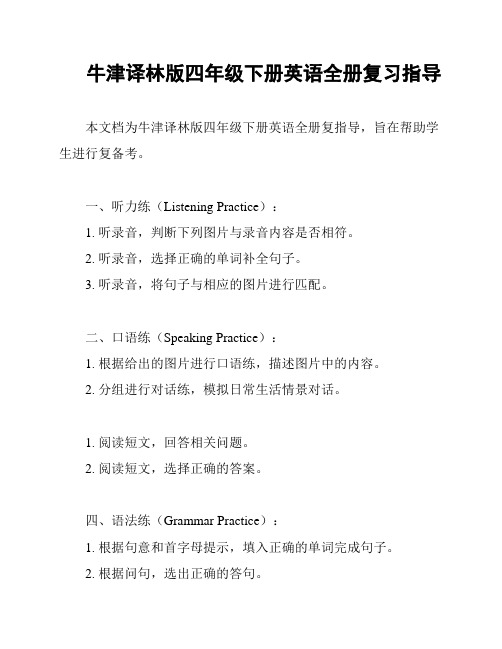
牛津译林版四年级下册英语全册复习指导
本文档为牛津译林版四年级下册英语全册复指导,旨在帮助学生进行复备考。
一、听力练(Listening Practice):
1. 听录音,判断下列图片与录音内容是否相符。
2. 听录音,选择正确的单词补全句子。
3. 听录音,将句子与相应的图片进行匹配。
二、口语练(Speaking Practice):
1. 根据给出的图片进行口语练,描述图片中的内容。
2. 分组进行对话练,模拟日常生活情景对话。
1. 阅读短文,回答相关问题。
2. 阅读短文,选择正确的答案。
四、语法练(Grammar Practice):
1. 根据句意和首字母提示,填入正确的单词完成句子。
2. 根据问句,选出正确的答句。
五、写作练(Writing Practice):
1. 根据给出的题目,写一篇关于自己的介绍。
2. 写一篇关于假期计划的短文。
六、翻译练(Translation Practice):
1. 将汉语翻译成英语。
2. 将英语翻译成汉语。
以上为牛津译林版四年级下册英语全册复习指导的内容,希望能够对学生的复习备考有所帮助。
牛津译林版四年级下册英语《Seasons》基础知识说课复习教学
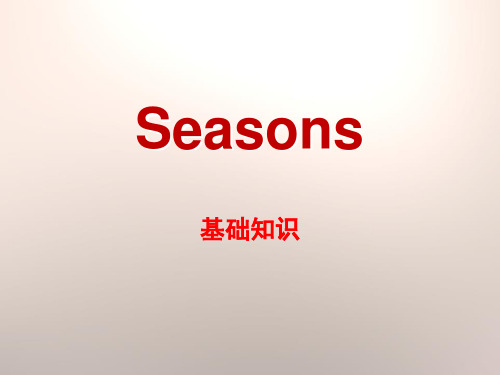
Unit 1 Hello! I’m Monkey.
人教精通版·三年级上册
Good morning! 早上好
Good morning, Miss Liu! Good morning, boys and girls!
Good morning!
Good morn
Morning!
Morning!
6.eat ice creams 吃冰淇淋
7.have picnics 野餐
8.go climbing
去爬山
9.make snowmen 堆雪人
10.go skating
去溜冰;去滑冰
11.a fine day
一个晴朗的日子
12.whose bag 谁的包
13.your jacket 你的夹克衫
14.a sunny day 晴朗的一天
A. Good afternoon! B. Good morning!
1.会用英语说下午好。 2.学会本课的说唱。
THANK YOU
3. In winter, I go skating and make snowmen. 冬天,我去滑冰和堆雪人。
4.—Is this your bag? 这是你的包吗?
—No, it isn't. 不,它不是。
5.—Whose bag is this? 这是谁的包?
—It's my bag! 它是我的包!
Good afternoon!
Good afternoo
pig
rabbit
Good afternoon!
Good afternoon!
合作交流 在小组内练习说下午好,然后展示给别的组。
Rabbit: Good afternoon, pig! Pig: ___A______________.
2016-2017学年度牛津译林版英语四年级下册全册期末复习知识点归纳

7.It’s time for PE.=It’s time to have a PE lesson.该上体育课了。
8.I don’t like that.我不喜欢那样。
9.What lessons do we/you have this morning/afternoon?我们/你今天上午/下午有哪些课?
4B英语复习知识点
Unit1 Our school subjects
单词:
1.school学校2.subject课程3.back背部;后面4.see看见,看到
5.timetable课程表;时间表6.English英语(课)7.Chinese语文(课)
8.Maths数学(课)9.Art美术(课)10.PE体育(课)11.Music音乐(课)
3.We have English,Chinese...and Science.我们有英语课,语文课...以及科学课。
并列的词语:2个A and B 3个及以上A,B,C and D
4.Whatsubjectsdo you like? I like ...你喜欢什么课程?我喜欢...
5.What about you?=How about you?你呢?(用于补充提问,简单重复前一个问句)
Unit3 My day
单词:
ually通常,常常2.morning早晨;上午3.lunch午饭4.afternoon下午
5.home家6.homework家庭作业7.dinner晚餐8.watch观看
9.evening傍晚;晚上10.night夜;深夜11.there在那里12.read阅读;朗读
e and play table tennis来打乒乓球4.have a football match进行一场足球比赛
最新译林版四年级英语下册复习知识点.docx

最新译林版四年级英语下册复习知识点Unit1 Our school subjects单词:1.school 学校2.subject课程3.back 背部;后面4.see 看见 ,看到5.timetable课程表;时间表6.English英语(课)7.Chinese语文(课)8.Maths数学(课)9.Art美术(课)10.PE 体育(课)11.Music 音乐(课)12.Science科学(课)13.fun 乐趣 ,快乐14.playground操场15.lesson 课16.Monday 星期一17.afternoon下午词组:1.our school subjects我们的学校课程l 欢迎回到学校3.our new timetable我们的新课程表4.Chinese and Maths语文和数学5.go to the playground去操场6.this morning/afternoon今天早上 / 下午7.have Music and Maths上音乐和数学课8.have PE and Science上体育和科学课9e 来做个蛋糕10.all like English都喜欢英语11.at school 在学校12.say and write 说和写13.some school subjects一些学校课程欢迎来到南京句子:1.Nice to see you.Nice to see you too.很高兴见到你(再次见面).2.Nice to meet you.Nice to meet you too.很高兴认识你(初次见面).3.We have English,Chinese...and Science.我们有英语课,语文课 ...以及科学课 .并列的词语: 2 个 A and B 3 个及以上A,B,C and D4.What subjects do you like? I like ...你喜欢什么课程?我喜欢...5.What about you?=How about you?你呢?(用于补充提问,简单重复前一个问句)6.It ’sfun. 它很有趣 .(fun 在这是不可数名词)7.It ’stime for PE.=It’stime to have a PE lesson.该上体育课了.8.I don ’tlike that.我不喜欢那样.9.What lessons do we/you have this morning/afternoon?我/你今天上午/下午有哪些?We have.../I have...我有/我有....()10.They like Music.他喜音.Unit2 After school:1.after在⋯⋯后面2.go 去3.day 天4.Wednesday星期三(WED)5.match比6.today今天7.pity憾8.Saturday星期六(SAT)9.Sunday星期日(SUN)10.Tuesday星期二(TUE)11.Thursday星期四(THUR)12.Friday星期五(FRI)13.when 什么候14.every每个16.week 一星期;周17.Monday星期一(MON):( * 的表示知道意思,能看懂即可 ,有余力的可以写一写)1.after school放学后2.go and play table tennis去打球2. 来打球 4.have a football match行一足球比5.have a swimming lesson有一游泳6.on Saturday在星期六7.have Chinese and Maths上文和数学8.every day每天9.get up 起床10.get up at six在六点起床11.in a week 在一星期 *12. the days of the week一周的日子 *13.talk about the lessons*句子:( * 的表示知道意思,能看懂即可 ,有余力的可以写一写)1.What day is it today? It’s ...今天星期几?今天星期...2.I have a swimming lesson.我有一游泳. She has a swimming lesson,too.她也有一游泳.3.What a pity!真憾!4.What about Saturday?星期六怎么?5.We don ’thave any lessons on Saturday.我星期六没有任何.6.All right.好的.7.What lessons do you have today?你今天有哪些课?8.When do you get up every day?At six.你每天几点起床?在六点.9.Seven days make a week.一个星期由七天组成. *10.There are seven days in a week.一个星期有七天.*Unit3 My day单词:ually 通常 , 常常2.morning早晨;上午3.lunch 午饭4.afternoon下午5.home 家6.homework家庭作业7.dinner晚餐8.watch观看9.evening 傍晚;晚上10.night夜;深夜11.there在那里12.read 阅读;朗读词组:(带 * 的表示知道意思 ,能看懂即可 ,有余力的可以写一写)ually go to school at seven forty通常在 7点40 上学2.my day 我的一天3.have four lessons in the morning在上午有四节课4.in the afternoon在下午5.have lunch at twelve在十二点吃午饭6.play football at four在四点踢足球7.go home at four forty在四点四十分回家8.get up at seven在七点起床9.do my homework at five thirty在五点半做家庭作业10.at night在晚上11.have dinner at six fifteen在六点十五吃晚餐12.watch TV at seven在七点看电视13.go to bed at nine every day每天九点睡觉14.good night晚安15.have breakfast吃早饭16.over there在那边19.daily activities日常活动 *20.meet Miss Li at three在三点见李老师句子:1.When do you get up/go to school/have lunch...?你什么候起床/ 上学 / 吃午 ...?At ...在...(几点)2.What can you see over there?你看看那是什么?3.What a big cake!多么大的一蛋糕啊!4.I like cakes.我喜蛋糕.U3 中主要的句子都在上P18-19, 多多写 .Unit4 Drawing in the park:1.drawing 画画2.park公园3.draw 画4.idea 主意 ,想法5.flower 花 ,花6.tree7.them 他 , 她 ,它8.easy 容易的 ,的9.boat小船10.river河;江11.difficult 的 ,困的12.try13.hill小山 ,山丘ke 湖 , 湖泊15.again 再一次 ,又一次16.before在⋯⋯之前:( * 的表示知道意思 ,能看懂即可 ,有余力的可以写一写)1.drawing in the park在公园里画画2.good idea 好主意3.see a tree and some flowers看到一棵和一些花4.draw them画它5. well done干得好6.the boat on the river在河上的小船7.on the hill在小山上8.the trees on the hill小山上的9.in this big box 在个大盒子里10.have a look看一看11.try again再12.at ten to ten在 9点 50 (十点差十分)13.go to bed before ten在十点前睡14.in the tree 在上(并非在上的)15.look at this picture看片 *16.a boat on the lake在湖上的一条小船17.talk about things in the park在公园里的事物*句子:1.Let ’sdraw some pictures here.让我们一起在这儿画画吧.2.Can you draw them?你能画出它们吗?Sure.It’seasy.当然可以.这很简单.3.This is the tree and these are the flowers.这是那棵树,这些是花.4.Can you see the boat on the river?你能看到河上的那条船吗?5.What can you see?你能看到什么?What can you see in it?你能看到什么在里面?What can you see now?现在你能看到什么?6.Can you draw it?你能画出它吗?It ’sdifficult,but I can try.有点困难,但我可是试一试.7.Is this a boat?这是一条船吗?8.What’sin this big box?在这个大盒子里有什么?9.Have a look.看一看.It ’s great fun.它非常有趣.Unit5 Seasons单词:(带 * 的表示知道意思,能看懂即可 ,有余力的可以写一写)1.season 季节2.spring 春天 ,春季3.warm 温暖的 ,暖和的4.fly 放(风筝、飞机模型等)5.kite 风筝6.summer 夏天 ,夏季7.hot 热的 ,炎热的8.autumn 秋天 ,秋季9.cool 凉爽的 ,凉快的10.picnic 野餐11.climb 攀登12.winter 冬天 ,冬季13.cold 冷的 ,寒冷的14.fine 晴朗的15.hey 嘿 ,喂16.whose 谁的17.sunny 晴朗的18.each 每;每个词组:(带 * 的表示知道意思,能看懂即可 ,有余力的可以写一写)1.four seasons四个季节2.in spring在春天3.fly kites 放风筝4.go boating去划船5.in summer在夏天6.eat ice creams吃冰淇淋7.go swimming 去游泳8.in autumn在秋天9.have picnics进行野餐10.go climbing去爬山11.in winter在冬天12.make snowmen 堆雪人13.go skating去滑雪14.a fine day一个好天15. a sunny day 晴朗的一天16.very cold非常冷17.all like the kite都喜欢这个风筝*18. talk about the four seasons谈论四季*19.four seasons in a year一年四季句子:1.In spring,it is warm.在春天 ,天气很暖和 .In summer,it is hot.在夏天 ,天气很炎热 .In autumn,it is cool.在秋天 ,天气很凉爽 .In winter,it is cold.在冬天 , 天气很寒冷 .2.We like spring/summer/autumn/winter.我们喜欢春天 / 夏天 / 秋天 / 冬天 .3.Here ’syour jacket.这是你的夹克衫 .(穿上你的夹克衫)4.Hey,is this your bag?嘿 ,这是你的包吗?5.Whose bag is this?这是谁的包?6.It ’smy bag. 是我的包 . She has my bag.她拿了我的包 .Unit6 Whose dress is this?单词:(带 * 的表示知道意思,能看懂即可 ,有余力的可以写一写)1.dress 连衣裙2.too 太 ,过于3.trousers 裤子4.party 聚会 ,派对5.glove 手套6.so 如此 ,这么7.coat 外衣 ,外套8.shirt (男式)衬衫9.sweater 毛衣;绒衣10.jeans牛仔裤11.shorts 短裤12.wrong 错的 ,错误的13.move 移动14. hand手15.hurt 感到疼痛*16.blouse (女式)衬衣词组:1.look at my sweater看我的毛衣2.try this试试这个3.try these试试这些(试试这条)4.all right好的5 .look at Su Yang ’看苏sgloves阳的手套 6.too long太长7.so big 如此大8.my father ’我scoat爸爸的上衣9 .my cousin’ s我dress堂姐的连衣裙10.so beautiful 如此美丽11.before eating fish在吃鱼之前12.listen to some English听一些英语13.eat my cake by the lake在湖边吃我的蛋糕*14.read and write读和写*15.the names of some clothes一些衣物的名称句子:1.Whose dress is this?这是谁的连衣裙?Whose gloves are these?这些是谁的手套?单数: Whose ... is this/that/it?It ’smy father’s.复数: Whose ...are these/those/they?They ’re my father’s.2.It ’stoo long. 它太长了 .They ’re so big. 他们可真大啊.3.Guess !猜一猜!Yes.You ’re right.是的.你说对了.No.You ’re wrong. 不 .你说错了 .4.It can move.它会移动.5.Is this a ball?这是一个球吗?I think so.我想是的.6.Let ’s play. 我们一起玩吧.7.What’sthe matter?怎么了?8.My hand hurts.我的手受伤了.Unit7 What's the matter?单词: (带 * 的表示知道意思, 能看懂即可 ,有余力的可以写一写)1.thirsty渴的,口渴的2.hungry饥饿的3.water水4.sad 伤心的5. ill 生病的6.dear亲爱的7.tired累的,疲劳的8.happy 快乐的 , 高兴的9.Mrs夫人,太太10.Mr 先生11.Miss 小姐12.speak 说话 ,讲话*13.pill药片*14.feeling感觉词组:(带 * 的表示知道意思,能看懂即可 ,有余力的可以写一写)1.e 来吃一个馅饼2.have some water喝一些水3.here you are给你4.want to go to bed想去睡觉5.good night晚安6.Mum and Dad妈妈和爸爸7.have a cake吃一个蛋糕8.Mrs Fox 狐狸女士Mrs Mouse 老鼠夫人9.show Rose your nose 给罗斯看你的鼻子10.take this pill吃这片药11.sitting still坐着不动*12.talk about feelings谈论感觉句子:1.What ’s the matter?怎么了?I ’m tired.我累了.* 拓展: What ’sthe matter with Liu Tao?刘涛怎么了?He is tired.他累了.2.Thank you. / Thanks.谢谢.3.But I’m not hungry.I’m thirsty.但我不饿.我有些渴.4.Can I have some water,Mum?妈妈,能给我一些水吗?5.Are you ill?你生病了吗?Yes,I ’m ill. 是的 ,我生病了 . No,I ’m thirsty.不,我有些渴.6.Good night,dear.亲爱的,晚安.Good night,Mum and Dad.爸爸妈妈,晚安.7.Here ’ssome water.这有一些水.Here are some cakes.这有一些蛋糕.Here ’s a fan. 这有把扇子 .Here is a hot dog.这有一个热狗.8.My baby Bill is sitting still.我的宝贝比尔坐着不动.If you’re ill,take this pill.如果你饿了,吃这片药.9.Are you all right?你还好吗?10.Have a cake.吃一块蛋糕.He is happy now.他现在开心了.Unit 8 How are you?单词:1.may 可以2.cold 感冒3.fever发烧4.hear听到,听见5.cough 咳嗽6.headache头疼,头痛7.tomorrow明天*8.doctor医生词组 :l 来学校 2 .can今’y天不能来学校3.have a cold and a fever感冒又发烧4.take care 保重5.see you tomorrow 明天见6. have a headache 头疼9.not so good不太好10.have a cough 咳嗽11.at school在学校 , 在上学12.the hot dog in the box在盒子里的热狗*13.go and see Doctor Wu去看吴医生14.see you after school放学后再见15.have a cough and a headache咳嗽又头疼*16.talk about some illness谈论一些疾病*17.make a telephone call打个电话*18.lunch for the fox狐狸的午餐句子:1.How are you?你好吗?How are you now?你现在怎样了?回答: I ’m fine,thank you.我很好,谢谢.Not so good.不太好I am ill.我生病了.I have a bad cold.我得了重感冒.2.电话用语: Hello,this is ... speaking.你好,我是...May I speak to... ?我能找一下...吗?Is ... there? ...在吗?Hello,this is ...(speaking).你好,我是...3.I ’m sorry to hear that.听到这个消息我很难过.4.太好了 .明天你能来上学吗?5.See you tomorrow.明天见.See you. 再见 .6.I have a cold and a fever too.我既感冒了又发烧了.Project 1 My school life*单词:(知道意思 ,能看懂即可 ,有余力的可以写一写)1.life 生活 ,生命2.map 地图3.cut切,剪4.stick粘贴 e 完成*词组:(知道意思 ,能看懂即可 ,有余力的可以写一写)1.my school life我的学校生活2.like Chinese, Science and Music喜欢语文、科学和数学3.make a map 制作一张地图4.make a map of your school制作一张你学校的地图5.my classroom我的教室6.have Chinese and Maths every day每天上语文课和数学课7.at my school在我的学校8.see a lot of flowers and trees看见许多花和树9.love my school爱我的学校10.play football here after school放学后在这儿踢足球Project 2 A party*单词:(知道意思 ,能看懂即可 ,有余力的可以写一写)1.party 聚会2.call 打电话给3.ask 问;邀请4.choose选择5.clothes衣服,衣物6.ready准备好的7.wear 穿着 ,戴着8.tell 告诉 ,说词组:(带 * 的表示知道意思,能看懂即可 ,有余力的可以写一写)1.have a party举行一个聚会*2.call your friends打电话给你的朋友们*3.this Sunday这个星期日y 邀请他们来参加聚会*5.y 来参加我的聚会*6.I’ d love我to很愿意*7.choose your clothes for the party为聚会挑选你的衣服*8.ask and answer the questions问和回答问题*9.tell your friend告诉你的朋友*句子:(带 * 的表示知道意思,能看懂即可 ,有余力的可以写一写)1.What ’s the matter with him?他怎么了?What ’sthe matter with her?她怎么了?*2.Are you ready for the party?准备好参加派对了吗?*3.This is my skirt for the party.这是我为派对准备的短裙.These are my clothes for the party.这是我为派对准备的衣服.。
牛津译林版英语四年级下册全册复习资料

牛津译林版英语四年级下册全册复习资料Unit 3 My Day Grammar Points1.ns of time: in。
on。
atIn:Used for seasons。
e.g。
in springUsed for ds of time。
e.g。
in the morning。
in the afternoon。
in the eveningOn:Used for days。
e.g。
on MondayAt:Used for specific times。
e.g。
at 3 o'clockUnit 1 Our School Subjects Grammar Points1.Asking about school subjects:Use "what" to ask about a subject。
e.g。
What do you like?Use "what" to ask about a specific class。
e.g。
What do you have this term?Use "what" to ask about subjects in general。
e.g。
What do you have?2.Capitalize the first letter of subject names。
e.g。
Science。
Chinesee "It's" to express that a subject is interestinge "morning" for today's morning。
and "in the morning" for any other morninge "in front of" to describe the n of the playground。
牛津译林版四年级下册4B英语期末复习全册知识点整理
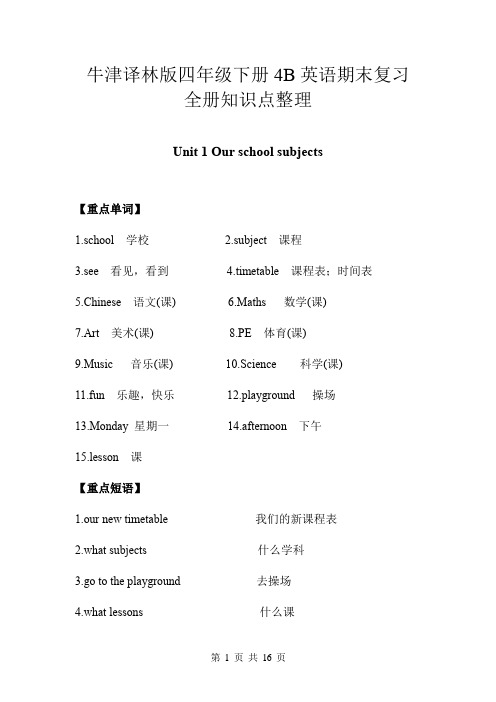
牛津译林版四年级下册4B英语期末复习全册知识点整理Unit 1 Our school subjects【重点单词】1.school 学校2.subject 课程3.see 看见,看到4.timetable 课程表;时间表5.Chinese 语文(课)6.Maths 数学(课)7.Art 美术(课) 8.PE 体育(课)9.Music 音乐(课) 10.Science 科学(课)11.fun 乐趣,快乐12.playground 操场13.Monday 星期一14.afternoon 下午15.lesson 课【重点短语】1.our new timetable 我们的新课程表2.what subjects 什么学科3.go to the playground 去操场4.what lessons 什么课5.this afternoon 今天下午6.make a cake 做蛋糕7.this morning 今天上午【重点句型】1.—Welcome back to school, class. 欢迎回到学校,同学们。
—Nice to see you, Miss Li. 见到你很高兴,李老师。
2. This is our new timetable. 这是我们的新课程表。
3.—What subjects do you like? 你喜欢什么学科?—I like Chinese and Maths. 我喜欢语文和数学。
4.I like English. It's fun. 我喜欢英语。
它很有趣。
5.It's time for PE. 该上体育课了。
6.Let's go to the playground. 让我们去操场吧。
7.—What lessons do we have this morning? 我们今天上午有什么课?—We have Music and Maths. 我们有音乐课和数学课。
牛津译林版四年级下册英语全册复习指南

牛津译林版四年级下册英语全册复习指南Unit 1: My School LifeIn this unit。
students will learn about us aspects of their school life。
including subjects。
classrooms。
and school rules。
They will practice asking and answering ns。
as well as describing their own school life experiences.Unit 2: My FamilyThe focus of this unit is on family ___ and learn to talk aboutfamily members using the ___.Unit 3: My WeekThis unit introduces the days of the week。
daily routines。
___ days.Unit 4: At the ZooStudents will embark on a virtual trip to the zoo in this unit。
They will learn the names of us ___.Unit 5: Food and DrinksThe focus of this unit is on food and ___ will learn the names of different types of food and drinks。
___。
They will learn how to order food in a ___.Unit 6: ClothesIn this unit。
students will learn the names of different ___ about shopping for clothes and learn to express their ___.Unit 8: ______ in this unit。
牛津译林版四年级下册英语全书复习资料
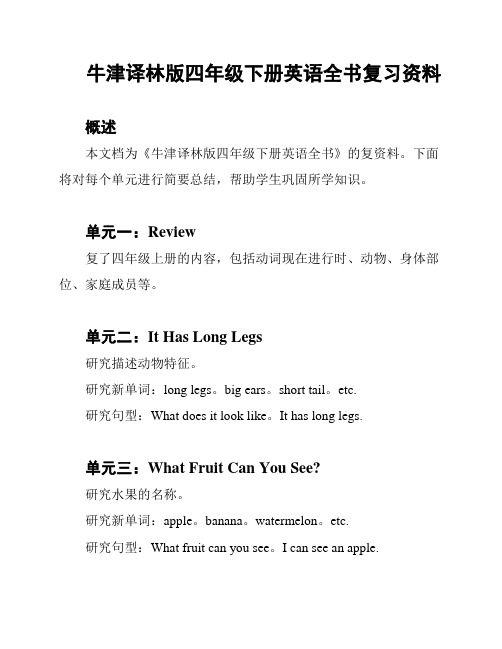
牛津译林版四年级下册英语全书复习资料概述本文档为《牛津译林版四年级下册英语全书》的复资料。
下面将对每个单元进行简要总结,帮助学生巩固所学知识。
单元一:Review复了四年级上册的内容,包括动词现在进行时、动物、身体部位、家庭成员等。
单元二:It Has Long Legs研究描述动物特征。
研究新单词:long legs。
big ears。
short tail。
etc.研究句型:What does it look like。
It has long legs.单元三:What Fruit Can You See?研究水果的名称。
研究新单词:apple。
banana。
watermelon。
etc.研究句型:What fruit can you see。
I can see an apple.单元四:What's the Time?研究问询时间的表达方式。
研究新单词:o'clock。
half past。
quarter past。
quarter to。
etc.研究句型:What's the time。
It's half past seven.单元五:Happy ___研究表达生日祝福的句子。
研究新单词:cake。
candles。
present。
etc.研究句型:Happy birthday。
Here's a present for you.单元六:In the Forest研究描述森林中的动物和植物。
研究新单词:forest。
rabbit。
squirrel。
mushroom。
etc.研究句型:What can you see in the forest。
I can see a rabbit.单元七:At the Zoo研究描述动物园中的动物。
研究新单词:zoo。
panda。
n。
tiger。
etc.研究句型:What animals can you see at the zoo。
牛津译林版四年级下册英语全册复习资料集
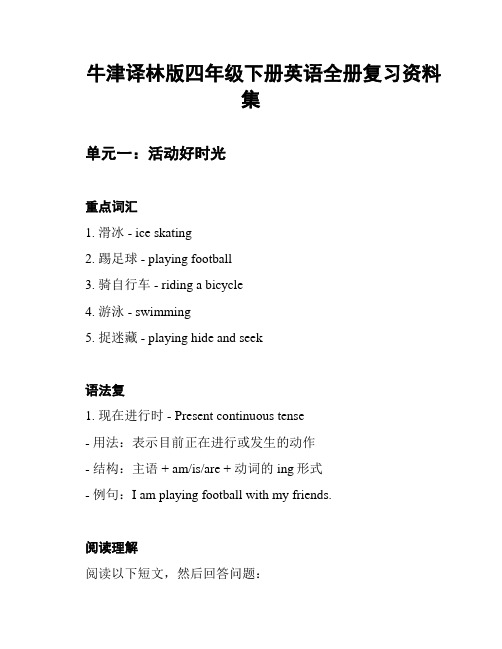
牛津译林版四年级下册英语全册复习资料集单元一:活动好时光重点词汇1. 滑冰 - ice skating2. 踢足球 - playing football3. 骑自行车 - riding a bicycle4. 游泳 - swimming5. 捉迷藏 - playing hide and seek语法复1. 现在进行时 - Present continuous tense- 用法:表示目前正在进行或发生的动作- 结构:主语 + am/is/are + 动词的ing形式- 例句:I am playing football with my friends.阅读理解阅读以下短文,然后回答问题:Tom and his family went ice skating last weekend. They had a great time on the ice. Tom's sister, Lucy, was skating very fast. Tom's dad was skating with Lucy. Tom's mom watched them and took some pictures. Tom was not good at ice skating, but he tried his best. He fell down a few times, but he didn't give up. In the end, he could skate a little bit. It was a fun day for the whole family.1. Where did Tom and his family go last weekend?2. Who was skating very fast?3. What did Tom's mom do?4. Was Tom good at ice skating?5. Did Tom give up when he fell down?单元二:田园农场重点词汇1. 农场 - farm2. 农民 - farmer3. 种蔬菜 - grow vegetables4. 收获 - harvest5. 动物 - animals语法复1. 一般现在时 - Simple present tense- 用法:表示客观事实或惯性动作- 结构:主语 + 动词原形- 例句:Farmers grow vegetables on the farm.阅读理解阅读以下短文,然后回答问题:Mr. Green is a farmer. He lives on a farm. Every day, he gets up early and goes to the farm. He grows vegetables and fruits. He takes care of the animals too. In the harvest season, he gathers all the crops. Mr. Green enjoys working on the farm. He loves nature and animals.1. What does Mr. Green do?2. Where does Mr. Green live?3. What does Mr. Green grow on the farm?4. What does Mr. Green do during the harvest season?5. Why does Mr. Green enjoy working on the farm? 单元三:城市生活重点词汇1. 城市 - city2. 大楼 - building3. 车站 - station4. 商店 - shop5. 公园 - park语法复1. 介词in, on, under - in, on, under- 用法:表示位置关系- 例句:There is a park in the city.阅读理解阅读以下短文,然后回答问题:Lisa lives in a city. There are tall buildings, shops, and a train station in the city. She goes to school by bus every day. After school, she likes to play in the park. Sometimes, she meets her friends there. Lisa enjoys the city life.1. Where does Lisa live?2. What can you find in the city?3. How does Lisa go to school?4. What does Lisa like to do after school?5. Does Lisa enjoy the city life or countryside life?单元四:生日派对重点词汇1. 生日 - birthday2. 蛋糕 - cake3. 气球 - balloon4. 礼物 - gift5. 唱歌 - sing语法复1. 祈使句 - Imperative sentence- 用法:表达命令、请求或建议- 例句:Sing a birthday song for your friend.阅读理解阅读以下短文,然后回答问题:1. Whose birthday is it today?2. What is at Lucy's birthday party?3. What will Lucy's friends do for her?4. How does Lucy feel on her birthday?5. Is Lucy unhappy on her special day?以上是《牛津译林版四年级下册英语全册复习资料集》的一部分,希望对你的复习有所帮助。
新译林版英语教材四年级下学期期末复习资料

一定要会默写下面的单词Unit 1 : 1. school学校 2. subject 科目 3. see看见 4. Chinese 语文 5. Maths 数学 6.Art 美术7. Music音乐8. lesson课9. Monday 星期一Unit2 : 1. Wednesday星期三2. Saturday 星期六3. Sunday星期日4. Tuesday星期二5.Thursday 星期四6. Friday 星期五7. get up 起床Unit 3: 1. usually通常2. go to school 去学校3. in the morning在早上4. in the afternoon在下午 5. go home回家6. homework家庭作业7. watch TV看电视8. in the evening在晚上Unit 4 : 1. park 公园2. draw画3. flower花4. them他们(宾格)5. boat船6. river河流7.lake 湖Unit 5: 1. season季节2. spring春天3. warm温暖的4. summer夏天5. hot热的6. autumn 秋天7. cool凉爽的8. winter冬天9. cold冷的Unit 6 : 1. dress长裙 2. party聚会 3. coat大衣,外套 4. shirt男式衬衫 5. sweater毛衣6.hand手Unit 7 : 1. thirsty渴的 2. water水 3. ill生病的 4. tired 累的 5. happy 高兴的Unit 8 : 1. may 可以 2. hear 听见3. take care保重 4. at school 在学校.一定要会默写下面的词组Unit 1 : 1.welcome to school 欢迎回到学校2.nice to meet you 很高兴见到你 3.our new timetable 我们的新课程表 4.what subjects 什么科目 5.what about you 你呢6.go to the playground 去操场7.what lessons 什么课8.like music 喜欢音乐9.this afternoon 今天下午10.like that 喜欢那样11.make a cake 做一块蛋糕12.say and write 读和写13.the names of some school subjects 一些学校科目的名称14.ask about school subjects 谈论学校科目Unit 2 : 1. go and play table tennis 去打乒乓球 2. have a football match 举行一场足球比赛3. have a swimming lesson 上一节游泳课 4. what a pity 多么遗憾 5. on Saturday 在星期六6. all right 好的7. every day 每天8. get up 起床9. at five 在五点10. my cap 我的鸭舌帽11. talk about the lessons 谈论课一定要会默写下面的词组Unit 3: 1. at seven 在七点2. at seven forty 在七点四十分 3. have four lessons 上四节课4. in the morning 在早上5. have lunch 吃午饭6. at twelve 在十二点7. in the afternoon 在下午8. do my homework 做我的家庭作业9. at five thirty 在五点三十分10. at six fifteen 在六点十五分11. every day 每天12. have dinner 吃晚饭13. over there 在那儿14. see a cake 看见一块蛋糕15. like cakes 喜欢蛋糕16. what a big cake 多么大的一块蛋糕19. talk about my day 谈论我的一天20. ask about daily activities 问有关日常活动Unit 4: 1. draw some pictures 画些画2. good idea 好主意3. see a tree and some flowers 看见一棵树和一些花4. draw them 画它们 5. well done 做得好6. on the river 在河面上7. in the park 在公园里8. in this big box 在这个大盒子里9. have a look 看一看10.great fun太有趣了11. try again 再试一次12. a boat on the lake 在湖面上的一艘船13. ten to ten 九点五十(十点缺十分)14. before ten 十点前15. ask questions 问问题16. talk about things in the park 谈论公园里的事物Unit 5: 1. in spring 在春天2. fly kites放风筝3. go boating 去划船4. like spring 喜欢春天5. in summer在夏天6. eat ice creams 吃冰激凌7.go swimming去游泳8.have picnics野餐9. go climbing去爬山10. make snowmen堆雪人11. go skating去滑冰12.a fine day一个晴朗的一天13. your jacket你的夹克衫14. whose bag谁的包15.my bag我的包16. like the kite喜欢这个风筝17. talk about the four seasons 谈论四个季节18. talk about activities 谈论活动19.in each season在每个季节Unit 6: 1.my dress 我的长裙2. too short 太短3.try this 试穿这个4. your trousers 你的长裤5. too long 太长6. try these 试穿这些7. go to the party 去聚会8. Su Yang’s gloves 苏阳的手套9. so big 这么大10.my cousin’s 我的表妹的11.so beautiful 这么漂亮12. I think so我认为是这样的13.eat fish 吃鱼14. listen to some English 听英语15.by the lake 在湖边16. the names of the some clothes 一些服装的名称一定要会默写下面的词组Unit 7: 1. come and have a pie过来吃一块馅饼2. have some water喝些水 3. here you are 给你4. want to go to bed 想去睡觉5. good night晚安6. all right好的7. have a cake吃一块蛋糕8.go home回家9. show Rose your nose向露丝展示你的鼻子10. my baby我的宝宝11. take this pill 服用这颗药12. talk about feelings谈论感觉Unit 8: 1. speak to Miss Li 和李老师说话2. come to school 来到学校3. have a cold and a fever患有感冒和发烧4. take care 保重5. see you tomorrow明天见6. not bad一般7. not so good 不好8. at school 在学校9. on Sunday 在星期天10. in the box在盒子里11. go and seea doctor去看病12. make a telephone call 打电话13. talk about some illnesses谈论一些疾病14. come to see you 来看你15. after school 放学后会默下面的重点句型:U1:1. Welcome back to school. 2. Nice to see you. 3. What subjects do you like? 4. I like Chinese and Maths. 5 What about you? 6.It’s time for PE. 7. What lessons do we have this morning? We have Music and Science.U2:1. What day is it today? It’s Wednesday. 2. I have a football match today. She has a swimming lesson too. 3. What a pity! 4. We don’t have any lessons o n Saturday. 5. When do you get up every day? I get up at five.U3:1. I usually go to school at seven forty. 2. I go to bed at nine every day. 3. What time is it? It’s seven o’clock. 4. What can you see over there? I can see a cake. 5. I like cakes. I lik e eating cakes.6. What a big cake! How big the cake is!U4: 1. I can see a tree and some flowers. 2. Can you draw it/them? Yes, I can./No, I can’t./ Sure.It’s easy./ It’s difficult, but I can try. 3. This is the tree and these are the flowers. 4. What’s in the big box? There’s a toy tiger. 5. Look at this picture.Project 1: Make a map of your school. 2. Talk about your school and your school life. 3. This is the playground. We can play football here after school.U5:1. In autumn, it’s cool. We make snowmen in winter. 2. Here’s a jacket. Here are some bags. It’s a fine day today. 3. She has my bag. 4. We all like the kite.U6:1. Look at my dress. It’s too short. 2. Try this/these. 3. Try this shirt on. Try these gloves on. They are so big. 4. Whose dre ss is this?/Whose is this dress? It’s my cousin’s. Whose trousers are they/Whose are the trousers? They are/They’re my father’s. 5. What’s this? It’s a ball. What are these? They are shorts. 6. Is this a skirt? Yes, it is./No, it isn’t. Are these shorts? Y es, they are./No, they aren’t. 7. I think so. My hand hurts.U7: 1. Can I have some water? Sure. Here you are. What’s the matter? I’m ill. I have a fever. 2. Are you ill? Yes, I am./ No, I’m not. 3. Here’s some water./Have some water, please.U8: 1. This is Yang Ling speaking. May I speak to Miss Li? Yes, this is Miss Li. 2. This is Mike. Is that David speaking? This is David. 3. Who is that? This is Wang Bing speaking. 4. I’m sorry to hear that. Take care, Yang Ling. 5. Is Bobby there? No, he’s at school. 6. How are you? I’m fine, thank you./ Not bad./Just so so./Not so good. 7. What’s the matter with him/her? He/She has a cough and a headache. 8. Can you come to my party this Sunday? Yes, I can./I’d love to./No, I can’t.Project 2: 1.We are going to have a party. Call your friends and ask them to come to the party. 2. Choose the clothes for the party. Colour and cut out the clothes. 3. Are you ready for the party? What are you going to wear? 4. These are my clothes for the party. 5. This is a yellow T-shirt and these are black shorts.。
牛津译林版四年级下册4B英语期末复习全册知识点整理
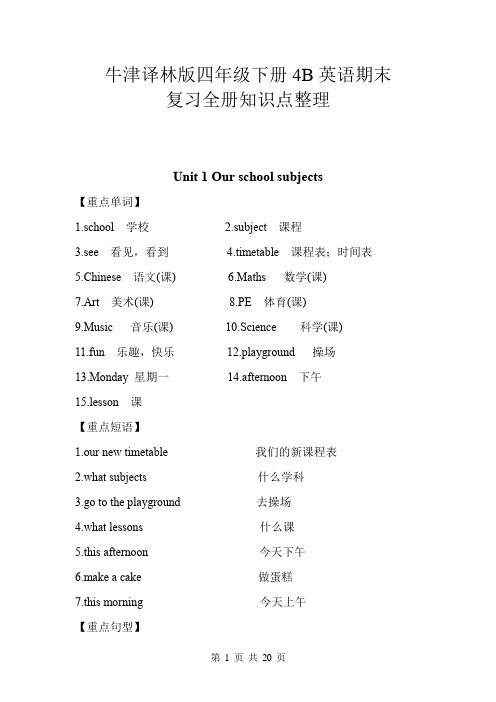
牛津译林版四年级下册4B英语期末复习全册知识点整理Unit 1 Our school subjects【重点单词】1.school 学校2.subject 课程3.see 看见,看到4.timetable 课程表;时间表5.Chinese 语文(课)6.Maths 数学(课)7.Art 美术(课) 8.PE 体育(课)9.Music 音乐(课) 10.Science 科学(课)11.fun 乐趣,快乐12.playground 操场13.Monday 星期一14.afternoon 下午15.lesson 课【重点短语】1.our new timetable 我们的新课程表2.what subjects 什么学科3.go to the playground 去操场4.what lessons 什么课5.this afternoon 今天下午6.make a cake 做蛋糕7.this morning 今天上午【重点句型】1.—Welcome back to school, class. 欢迎回到学校,同学们。
—Nice to see you, Miss Li. 见到你很高兴,李老师。
2. This is our new timetable. 这是我们的新课程表。
3.—What subjects do you like? 你喜欢什么学科?—I like Chinese and Maths. 我喜欢语文和数学。
4.I like English. It's fun. 我喜欢英语。
它很有趣。
5.It's time for PE. 该上体育课了。
6.Let's go to the playground. 让我们去操场吧。
7.—What lessons do we have this morning? 我们今天上午有什么课?—We have Music and Maths. 我们有音乐课和数学课。
牛津译林版小学英语四年级下册期末复习
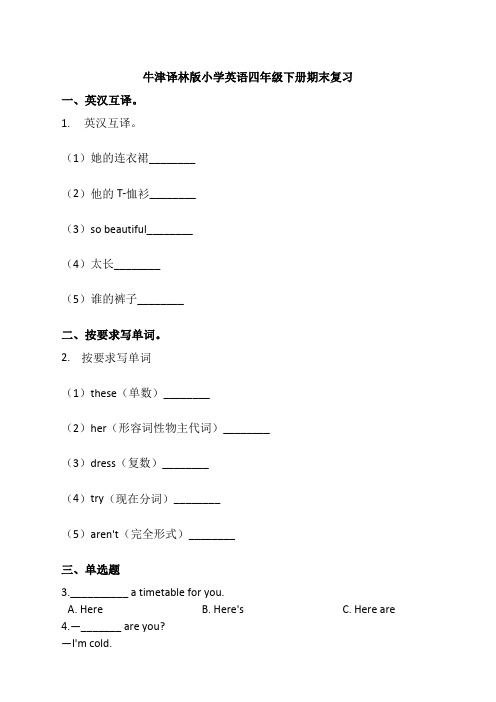
牛津译林版小学英语四年级下册期末复习一、英汉互译。
1. 英汉互译。
(1)她的连衣裙________(2)他的T-恤衫________(3)so beautiful________(4)太长________(5)谁的裤子________二、按要求写单词。
2. 按要求写单词(1)these(单数)________(2)her(形容词性物主代词)________(3)dress(复数)________(4)try(现在分词)________(5)aren't(完全形式)________三、单选题3.__________ a timetable for you.A. HereB. Here'sC. Here are4.—_______ are you?—I'm cold.A. HowB. How oldC. Who5.We usually go ___________ in summer.A. fly kitesB. swimmingC. make snowmen6.—_______—I'm hungry.A. What would you like?B. What can you do?C. What's the matter?7.— Whose shorts ?—They're Su Yang's.A. is thisB. are theseC. this8.The coat is too .A. biggerB. tallC. big9.—I'm hot.—Here's a __________for you.A. chairB. fanC. jacket10.I can see some________on the tree.A. chickensB. birdsC. pigs11.That's ____ easy!A. tooB. toC. many12.I can see some on the lake.A. fishB. chickenC. ducks13. do you get up?A. WhoB. WhatC. When14.That a week.A. makeB. makesC. making15.The Music book is _______ the living room, ________ the desk.A. on; inB. in; onC. at; on16.I go home 5:30 every day.A. inB. onC. at17.It's time do my homework.A. toB. /C. for四、单词拼写(词汇运用)18.Let's go to the________ (操场).19.What day is it ________(今天)?20.He________ (有)a swimming lesson.21.It's ________ (星期三)today.22.I________(喜欢) eating sandwich for lunch.五、选词填空(词汇运用)23.________(in/on)spring, we fly kites.24.Look at that________ (snowman/snowmen)It's cool.25.—Can you draw a tiger?—It's________(easy/difficult), but I can try.26.I can't draw ________(they/them).27.Let's ________(draw/drawing) some pictures.六、句型转换28.I like summer.(改为否定句)________29.He can see a bird on the tree .(改为一般疑问句)________30.It is a duck on the lake. (改为一般疑问句)________31.He can do some reading .(改为否定句)________32.I like autumn. (改为一般疑问句)________33.They're on the desk. (就划线部分提问)________七、情境匹配。
牛津译林版四年级英语下册 (全册)单元知识

四下Unit 1 Our school subjects 单元知识点四会单词1. school学校2. subject课程3. see看见,看到4. Chinese语文(课)5. Maths 数学(课)6. Art 美术(课)7. Music音乐(课)8. lesson课9. Monday星期一三会单词1. Welcome back to…欢迎回到…2. timetable课程表,时间表3. PE体育(课)4. Science 科学(课)5. fun乐趣,快乐6. go to 去……7. playground 操场8. afternoon 下午四会词组1. our school subjects 我们的学校课程2. see you 见到你3. Chinese and Maths 语文和数学4. what subjects 什么课程5. like English 喜欢英语6. time for PE 该上体育课的时间7. Art and Music 美术和音乐8. what lessons 什么课9. have Music and Maths 有英语课和数学课10. my school subjects 我的学校课程三会词组1. back to school 回到学校2. our new timetable 我们的新课程表3. Music and Science 音乐和科学4. go to the playground 去操场5. this morning 今天早上6. this afternoon 今天下午7. on Monday 在星期一8. like PE 喜欢体育课9. don’t like that 不喜欢那个10. don’t skate 不要滑冰11. make a cake 做一个蛋糕12. at school 在学校四会三会句型1. Welcome back to school, class. 欢迎回到学校,同学们。
牛津译林版四年级下册英语全书复习手册
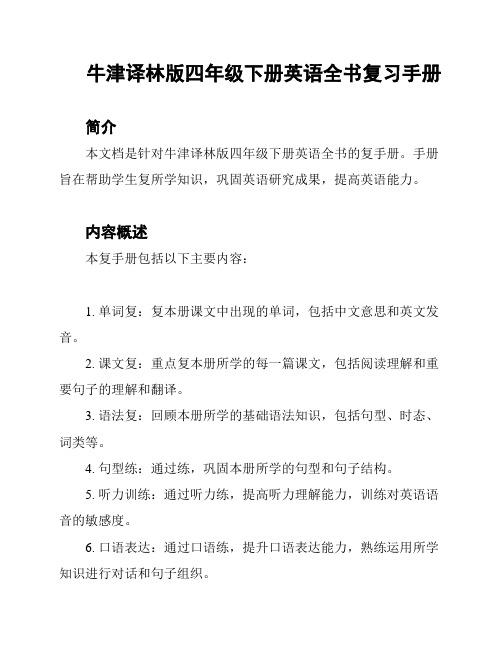
牛津译林版四年级下册英语全书复习手册简介本文档是针对牛津译林版四年级下册英语全书的复手册。
手册旨在帮助学生复所学知识,巩固英语研究成果,提高英语能力。
内容概述本复手册包括以下主要内容:1. 单词复:复本册课文中出现的单词,包括中文意思和英文发音。
2. 课文复:重点复本册所学的每一篇课文,包括阅读理解和重要句子的理解和翻译。
3. 语法复:回顾本册所学的基础语法知识,包括句型、时态、词类等。
4. 句型练:通过练,巩固本册所学的句型和句子结构。
5. 听力训练:通过听力练,提高听力理解能力,训练对英语语音的敏感度。
6. 口语表达:通过口语练,提升口语表达能力,熟练运用所学知识进行对话和句子组织。
7. 写作练:通过写作练,培养学生的写作能力,包括句子的组织、语法运用和词汇的丰富。
使用方法学生可以按照以下步骤使用本复手册:1. 阅读简介:了解手册的内容和目标。
2. 分块复:按照章节或单元划分,分块进行复。
3. 复单词:先复本册中出现的单词,熟悉单词的意思和发音。
4. 复课文:仔细阅读每一篇课文,理解重要句子的意思和翻译。
5. 进行练:完成手册中的练题,包括语法练、句型练、听力训练、口语表达和写作练。
6. 检查答案:核对练题的答案,找出自己的错误并进行订正。
7. 提高巩固:针对错误的地方进行重点复和训练,加强薄弱环节。
通过有计划地使用本复手册,学生可以有效地复英语知识,提高英语水平。
结束语希望本复习手册能够帮助学生巩固所学的英语知识,提高自己的英语能力。
祝愿大家学习进步,取得好成绩!。
译林版四年级下册复习资料
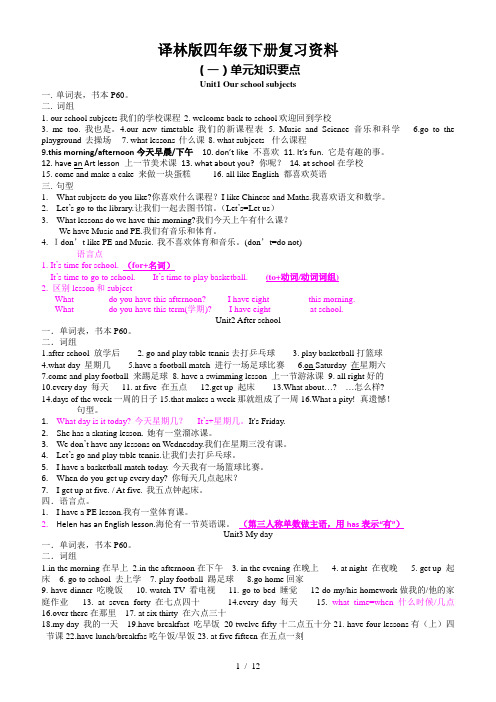
译林版四年级下册复习资料(一)单元知识要点Unit1 Our school subjects一. 单词表,书本P60。
二.词组1. our school subjects我们的学校课程2. welcome back to school欢迎回到学校3. me too. 我也是。
4.our new timetable 我们的新课程表5. Music and Science 音乐和科学6.go to the playground 去操场7. what lessons 什么课8. what subjects 什么课程9.this morning/afternoon今天早晨/下午10. don’t like 不喜欢11. It’s fun. 它是有趣的事。
12. have an Art lesson 上一节美术课13. what about you? 你呢?14. at school在学校15. come and make a cake 来做一块蛋糕16. all like English 都喜欢英语三. 句型1.What subjects do you like?你喜欢什么课程?I like Chinese and Maths.我喜欢语文和数学。
2.Let’s go to the library.让我们一起去图书馆。
(Let’s=Let us)3.What lessons do we have this morning?我们今天上午有什么课?We have Music and PE.我们有音乐和体育。
4. Idon’t like PE and Music. 我不喜欢体育和音乐。
(don’t=do not)语言点1. It’s time for school. (for+名词)It’s time to go to school. It’s time to play basketball. (to+动词/动词词组)2. 区别lesson和subjectWhat _______ do you have this afternoon? I have eight ________ this morning.What _______ do you have this term(学期)? I have eight ________ at school.Unit2 After school一.单词表,书本P60。
- 1、下载文档前请自行甄别文档内容的完整性,平台不提供额外的编辑、内容补充、找答案等附加服务。
- 2、"仅部分预览"的文档,不可在线预览部分如存在完整性等问题,可反馈申请退款(可完整预览的文档不适用该条件!)。
- 3、如文档侵犯您的权益,请联系客服反馈,我们会尽快为您处理(人工客服工作时间:9:00-18:30)。
4B U1-U8知识点整理Tips:划横线为必背内容,加粗字体为重要知识点,★能力题选背。
Unit1 Our school subjects语法考点1.问学科:what问课what ;如:What do you like? 你喜欢什么学科?如:What do you have this term(学期)?如:What do you have?2. 学科类名词首字母要; 如:科学;语文3. 评价某个学科有趣用It's ;4. 今天早上用morning; 早上用morning;5. 操场前面要加; 如去操场;6. 多个学科并列时要用逗号隔开(不能用顿号),最后两个单词之间要用连接;Unit2 After school语法考点1. 星期考点①星期一到星期天分别是(拼写):星期一;星期二;星期三;星期四;星期五;星期六;星期天;②英语中,一个星期的第一天是;如is the first(第一) day of a week(一周).is the (第二) day of a week(一周)③在星期几前面的介词用;; 在星期几的上午在星期后加在星期几的下午在星期后加; 如:在星期天上午④对星期几提问特殊疑问词用;2. It's time for / to考点(是时候做...)It's time for.I It’s time to3. some、any 考点①some在部分疑问句和否定句中要改为②用于征求对方意见并且希望得到肯定答复的时候,some无须改为any;总结为以下3种情况(1)Would you like some ... ? (2)What/How about some ... ? (3)Can I have some ...? (详见U7语法考点)4. like考点①like后接可数名词要用复数形式; 如:like mangoes②like后接动词时要用动词ing形式; 如:like playing basketballUnit3 My day语法考点1. 时间介词in, on,at 的考点in考点①四季前介词用in, 如:in spring②in还可以表示在“某段时间内”,如:在早晨in the morning 在下午in the afternoon 在晚上in the eveningon考点①在星期几前介词用on ,如on Sunday, on Monday②在星期几的上午/下午/晚上用:on + 星期几+ 上午/下午/晚上如:on Saturday morning 在星期六早上③在晴朗的一天介词用on, 如:on a sunny day 在晴朗的一天at考点①在“几点”前介词用at, 如:at seven thirty②固定搭配:at night 在夜里2. 两种问时间的表达法:What time is it (now)? = What’s the time? (现在)几点了?回答统一用:It's + 几点3. When考点When 询问的是时间范围回答一般用at;如:—你早上什么时候吃早饭?When do you have breakfast in the morning?—我在八点半吃早饭。
I have breakfast at eight thirty.注:含有When的疑问句回答必须用at + 时间,不能用It's + 时间4. 中英文时间表达差异性:通常中文中的时间在前面,翻译为“我在什么时间做什么事。
”而英语中时间放在句末,且小时间在前,大时间在后,如:I get up at six thirty in the morning.5. 时间表达法①整点表达法:数字+ o’clock; o’clock也可省略;②非整点表达法:按从左到右的顺序,依次先说小时数,再说分钟数。
如:11:05 eleven five★能力题:时间表达法:(1)分钟数< 30分钟结构:分钟数+ past(超过) + 小时数即几点超过几分如:3:20 twenty past two(2)分钟数> 30分钟结构:分钟数+ to(差) + 小时数即几点差几分如:1:55 two to two6. 动词原形的考点①can / can’t + 动词原形能/不能做... 如:He can skate.②want to + 动词原形想要做... 如:I want to swim.③don’t + 动词原形不要... 如:Don’t shout.④let’s + 动词原形让我们... 如:Let’s draw pictures.Unit4 Drawing in the park语法考点1. draw考点draw表示画;是一个动词; 动词后接人称代词时要用宾格形式; 如:draw them画它们;2. have a look/ look at ...考点have a look 表示看一看; 其后若接看的某个物体时要加介词at; 如:have a look at your shirt 3. in/on the tree 区别in the tree表示外来物在树上,如小鸟、猴子、气球等。
on the tree表示长在树上的东西,如树叶、果实等。
4. 含有情态动词can的一般现在时结构和考点can是情态动词,表示能、会、可以,没有人称和数的变化,can后接动词原形。
①肯定句:主语+can+动词原形+其它如:Mary can draw and she can make a cake. 玛丽会画画并且她会做蛋糕。
②否定句:主语+can’t+动词原形+其它如:He can't play basketball. 他不会打篮球。
③一般疑问句:Can+主语+动词原形+其它?肯定回答:Yes,... can.否定回答:No, ... can't.如:Can you make a salad? 你会做沙拉吗?Yes, I can./ No, I can't. 是的,我会。
/不,我不会。
④特殊疑问句(1)对动词后短语提问:特殊疑问词+can+主语+动词原形+其它?(2)对动词短语提问:特殊疑问词+can+主语+do+其它?5. Let’s ... 考点Let’s=Let us... + 动词或动词词组原形。
表示让我们…...吧。
如:Let’s draw some pictures here. 让我们在这画一些图画吧。
★能力题:名词性词组例:the boat on the river 湖面上的船统一翻译为:......(哪里)的......;中间不能用be动词连接结构为:名词词组+ 介词短语如:山上的一些花要先写some flowers 再写介词短语on the hill答案为:some flowers on the hill(√) 翻译为:山上的一些花some flowers are on the hill(×) 翻译为:一些花在山上★能力题:before doing sth. 在做...之前before; 表示在……之前; 反义词为:after表示在……之后; before ten; 在10点之前after或before后面如果接动词要用动词的ing形式; 如:before eating fish;在吃鱼之前;Unit5 Seasons语法考点1. 四季考点①四季分别是: 春spring;夏summer;秋autumn;冬winter; 季节前介词用in; 季节总称是seasons;②四季气候特征:春warm;夏hot;秋cool;冬cold;③四季对应可做的事:go结构春go boating;夏go swimming;秋go climbing;冬go skating;单复数结构春fly a kite = fly kites; 夏eat an ice cream = eat ice creams;秋have a picnic = have picnics;冬make a snowman = make snowmen;④天气+季节的表达方式(2种)(1) It's + 形容词+ in + 季节如:It's hot in summer. (注:It's+形容词在前的无逗号)(2) In + 季节,it is + 形容词如:In spring, it is warm. (注:In+季节在前的有逗号)★能力题:在寒冷的/热的/凉爽的/暖和的一天/早晨/下午/晚上。
如on a cool morning 在一个凉爽的早晨on a hot day 在炎热的一天结构为:on + a + 形容词(冷/热/凉/暖) + day或morning/afternoon/eveninga fine day; 表示一个晴朗的日子; fine反义词为bad;表示糟糕的;不好的;2. go + 动词ing考点①go后接动词,动词要用ing形式;②动词ing形式的变化规则:(1)大部分情况,直接在动词词尾加ing; 如:go boating; go climbing;(2)动词以e结尾的去e加ing; 如:go skating;(3)特殊情况(重读闭音节),须双写末尾字母加ing; 如:go swimming;3. Here + is/are 考点①Here’s + 名词单数Here’s your chair. 你的椅子在这儿。
(单数)②Here’s + 不可数名词Here’s some water in the glass. 杯子里有一些水。
(不可数)③Here are + 名词复数Here are your books. 你的书在这儿。
(复数)注:星灿考试中很多像( )Here’s some ________. A. book B. pies C. juice 的考题同学们错的最多,且错误的都选的B; 因为只关注了some;some后除了接名词复数,也可接不可数名词;而没有注意到Here’s实际就是Here is; is后只跟上述的①②两种情况;故正确答案选C.4. have, has的区别I have a PE lesson.我有一堂体育课。
Helen has an English lesson.海伦有一节英语课。
①当主语为第三人称单数时,have要变为has;②第三人称单数简称三单; 三单定义:除了you和I以外的单数或不可数名词都是三单;5. 夏天昼长夜短,冬天昼短夜长(阅读理解常考)In summer, the day is long and the night is short. 夏天白天长,晚上短。
